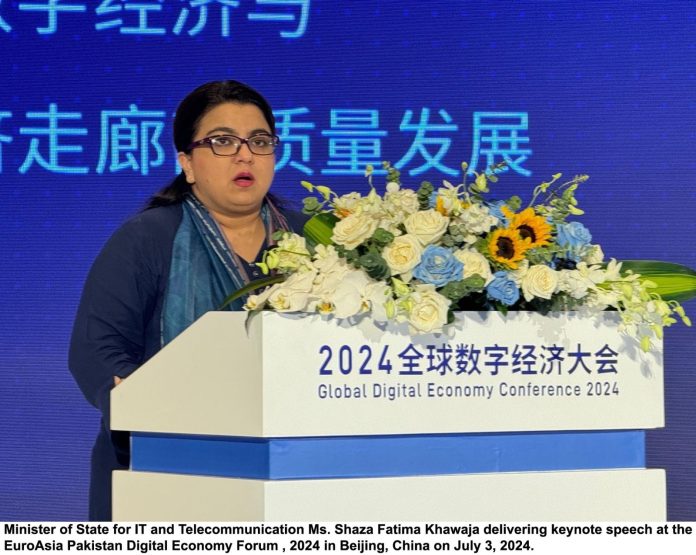BEIJING, July. 4 (APP):Minister of State for IT and Telecommunications, Shaza Fatima Khawja said that in the next stage, the collaboration between Pakistan and China would extend from traditional to new or upgraded economic corridors such as transportation, circulation and exchange of data.
“Pakistan’s human resources could not be underestimated in the world. 60% of our population is under the age of 35, which is both an opportunity and a challenge. By working closely with China to provide systematic sci-tech training to such a huge talent pool, we are going to maximize the role of our valuable resources in such a digital age,” she said at the EuroAsia Pakistan Digital Economy Forum held in Beijing.
The Minister gave a detailed introduction to the experience gained by Prime Minister Sharif after his recent visit to China with a delegation, repeatedly emphasizing that the Pakistani government has regarded the digital field as a top priority for current governance, CEN reported on Thursday.
Dr. Zhao Baige, recipient of the “Medal of Excellence Crescent” National Honorary Medal of Pakistan, echoed by a series of specific suggestion. “Training of all types and levels badly need to be a top priority. Training at not only the government level, but also non-governmental and corporate levels should be included in the entire system, due to the cross-border connections are the key to the success of the entire digital economy revolution.”

Moreover, Pakistani partners are very eager to form a CPEC digital economy park, in which Beijing has very rich experience. We hope that through our step-by-step construction, the China-Pakistan Digital Corridor will become an important leader in the global digital economy.
Regarding the digitalized CPEC, participants from both countries contributed wonderful ideas. “We are working hard to build our communication network through cables from China to Karachi and other cities in Pakistan under the framework of the China-Pakistan Economic Corridor. In the future, whether it is Xinjiang, Karachi, or Gwadar Port, the digital corridor will make a huge difference,” Marouf Ali Shahani, COO of Cyber Network Company, introduced.
“In 2023, Beijing’s digital economy has achieved an added value of 1.8 trillion-yuan, accounting for 42.9% of the region’s GDP.Deputy Secretary-General of the Beijing Municipal Government, Xu Xinchao, pointed out in his keynote speech at the forum that Beijing is accelerating the construction of a global digital economy benchmark city and exploring the construction of a “Digital Silk Road” pilot zone.
“Beijing and global innovative countries and regions such as Singapore, the United Arab Emirates, and Pakistan are working together to explore a new multi-channel model of economic cooperation for the Digital Silk Road”.
So, how can data connectivity be applied to the cooperation framework? Enterprises from both countries have already created the first spark of cooperation, looking forward to a bright future.
“Pakistan has abundant medical resources, but hospitals are highly independent of each other, thus doctors have to repeatedly enter data and passwords when using different systems, which wastes their precious time. The inability to share data between medical institutions means that patients sometimes have to wait for hours to get diagnosis results,” said Shoaib Ahmed Khan, CEO of Engineering Advanced Research Center.
“Through brainstorming with Pakistani partners, we have full confidence in the local market. It is entirely feasible to bring domestic medical informationization standards to Pakistan. We also look forward to more win-win cooperation with our Pakistani counterparts,” Vice President of Donghua Medway Technology Co., Ltd, Huang Hongxia, envisioned.

















